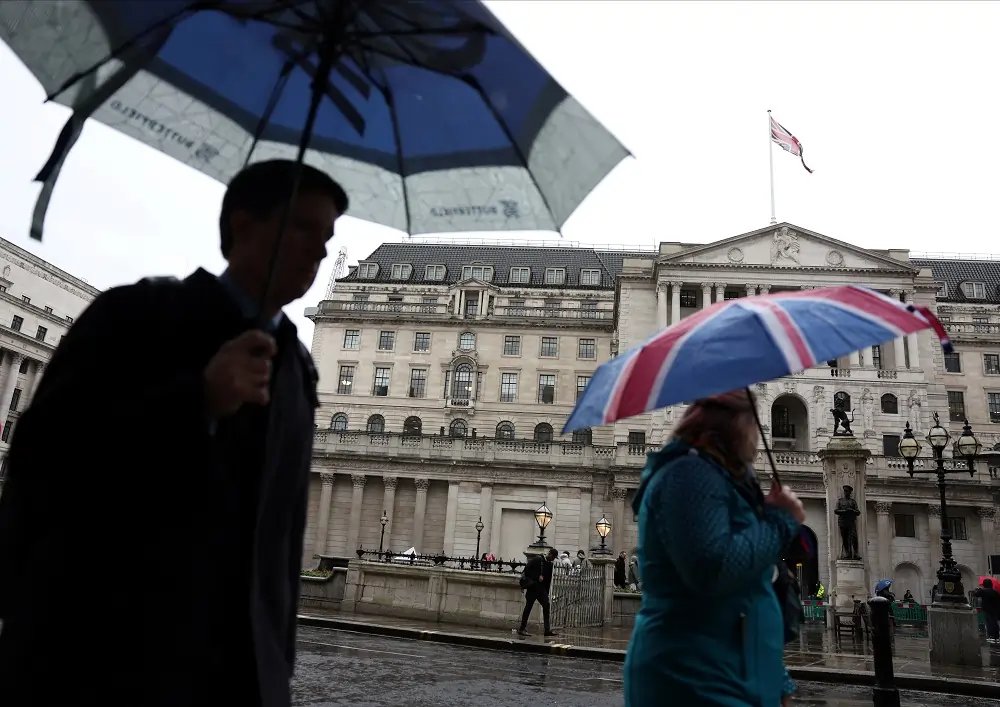UK inflation jumps to 2.3%, underscoring BoE’s stance for gradual rate cuts
Published by Jessica Weisman-Pitts
Posted on November 20, 2024
4 min readLast updated: January 28, 2026

Published by Jessica Weisman-Pitts
Posted on November 20, 2024
4 min readLast updated: January 28, 2026

By William Schomberg and David Milliken
LONDON (Reuters) -British inflation jumped by more than expected last month to rise back above the Bank of England’s 2% target and underlying price growth gathered speed too, showing why the BoE is moving cautiously on interest rate cuts.
Consumer prices rose by an annual 2.3% in October, pushed up almost entirely by an increase in regulated domestic energy tariffs, after a 1.7% rise in September which was the first time the inflation rate had fallen below the BoE’s target since 2021.
Sterling strengthened by almost a third of a cent against the U.S. dollar after the data was published before giving back most of that rise. Interest rate futures priced in a slightly slower pace of rate cuts and bond prices fell.
The BoE’s most recent forecast and a Reuters poll of economists had both pointed to a weaker CPI reading of 2.2%.
James Smith, research director at the Resolution Foundation think tank, said a rise had been expected as last year’s energy price falls dropped out of the annual calculation and the price cap increased in October.
“But the clean sweep of higher headline, core and services inflation has delivered a triple dose of bad news for families and policymakers alike,” he said.
The increase took inflation to a six-month high and represented the biggest month-to-month rise in the annual CPI rate since inflation peaked in October 2022.
Services inflation – which the BoE views as a key measure of domestically generated price pressure – rose to 5.0% in October from 4.9% in September, the Office for National Statistics said, in line with BoE and market expectations.
But core inflation, which excludes energy, food, alcohol and tobacco prices, picked up to 3.3% from September’s 3.2%, bucking market expectations for a fall.
The BoE said this month it expected headline inflation to tick up to 2.4% and 2.5% in November and December. Price growth is likely to approach 3% in the second half of next year, it says. Some private-sector economists think inflation will rise close to 3% in early 2025.
GLOBAL UNCERTAINTY
The BoE has said the first budget of Britain’s new government will probably add to inflation next year and U.S. President-elect Donald Trump’s threat to impose sweeping import tariffs adds to uncertainty about the outlook.
Monica George Michail, an associate economist at Britain’s National Institute of Economic and Social Research think tank, said interest rates might stay elevated for longer.
“This outlook reflects forecasted inflationary pressures stemming from the recently announced budget, in addition to heightened global uncertainty, particularly surrounding the Trump presidency,” she said.
The new government of Prime Minister Keir Starmer has promised to speed up Britain’s economic growth but has come under fire from employers for the higher employment taxes that they will have to pay from April next year.
The BoE has said that could lead to higher prices as well as job losses.
Chief Secretary to the Treasury Darren Jones said the government was trying to reduce the impact of the higher cost of living, including with a latest increase in the minimum wage, “but we know there is more to do.”
Mel Stride, the Conservative opposition’s would-be finance minister, said the government’s fiscal watchdog had already been predicting higher inflation as a result of the budget.
“What is worrying about today’s announcement is that inflation is running ahead of expectations and official forecasts state these figures are not expected to improve,” he said.
There is also upward pressure on prices from the jobs market where many employers face a shortage of candidates.
Data last week showed British pay grew at its slowest pace in more than two years in the three months to the end of September. But BoE Chief Economist Huw Pill said wage growth was stuck at levels that were too high for the central bank.
Investors on Wednesday were pricing around 60 basis points of BoE rate reductions by the end of 2025, equivalent to between two and three cuts, down from about 65 basis points of cuts expected by investors before the inflation data.
Two-year British government bond yields, which are sensitive to interest rate speculation, rose by around 4 basis points.
Governor Andrew Bailey on Tuesday stressed the BoE’s message that borrowing costs are likely to come down only gradually.
There were signs of some weaker inflation pressures in the pipeline. Prices charged by factories for their goods fell by 0.8% in the 12 months to October, the biggest drop since October 2020 during the COVID pandemic.
(Reporting by William Schomberg; editing by David Milliken, Sarah Young and Toby Chopra)
Inflation is the rate at which the general level of prices for goods and services rises, eroding purchasing power. It is typically measured by the Consumer Price Index (CPI).
The Bank of England is the central bank of the United Kingdom, responsible for issuing currency, maintaining monetary stability, and overseeing the financial system.
Interest rates are the cost of borrowing money or the return on savings, expressed as a percentage. They are influenced by central bank policies and economic conditions.
Core inflation measures the long-term trend in prices by excluding volatile items such as food and energy. It provides a clearer view of underlying inflation trends.
Monetary policy refers to the actions taken by a central bank to manage the money supply and interest rates to achieve macroeconomic objectives like controlling inflation.
Explore more articles in the Finance category
